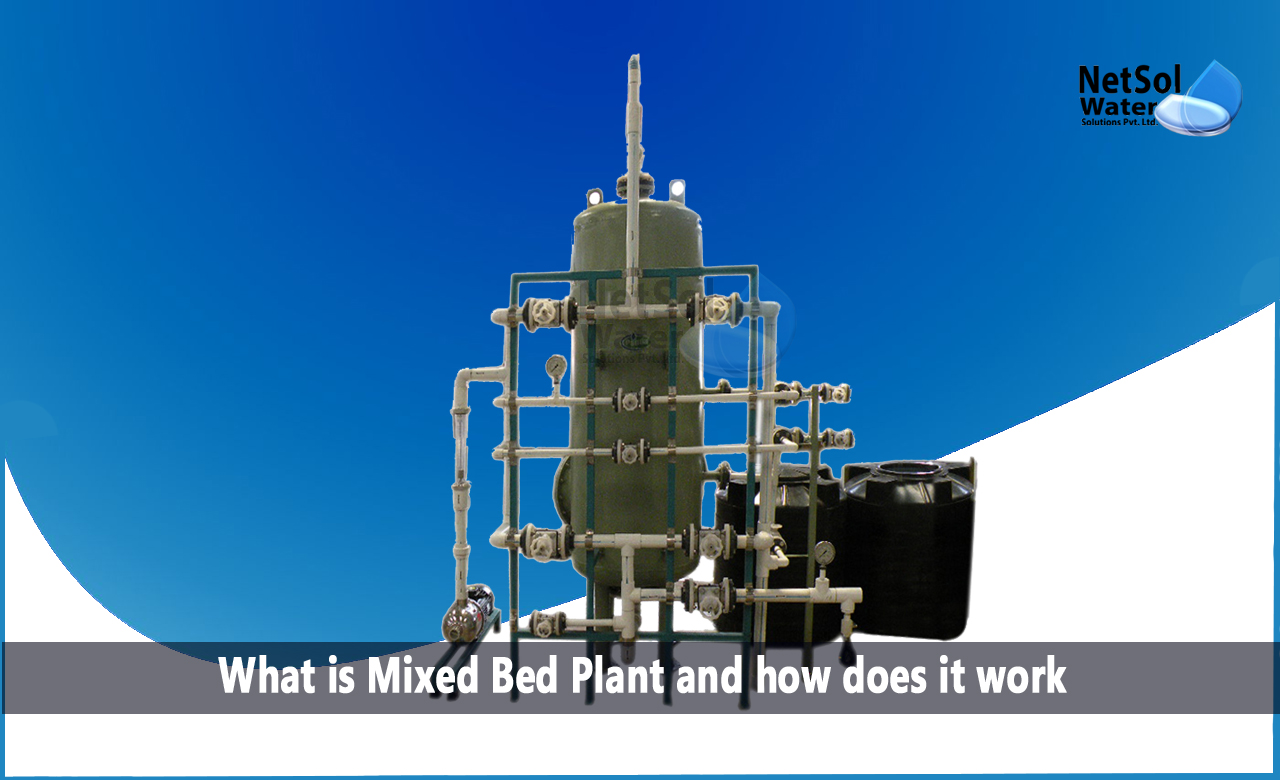Water treatment is a critical process in many industries, ranging from power generation to pharmaceuticals. Mixed Bed Plant (MB Plant) is a widely used water treatment process that produces high-purity water for industrial applications.
Let us now discuss what is mixed bed plant and its working.
What is Mixed Bed Plant and how does it work?
Mixed Bed Plant (MB Plant) is a water treatment process that uses a combination of ion exchange resins to remove dissolved impurities from water, including cations and anions. The process involves mixing two types of resins, one containing positively charged ions (cation exchange resin) and the other containing negatively charged ions (anion exchange resin), to form a single bed of resin.
How does MB Plant work?
The process of MB Plant is shown below in flow diagram:
As shown in the diagram, the mixed bed plant involves pretreatment, cation exchange resin bed, anion exchange resin bed, mixed bed resin, and polishing. The process involves a series of ion exchange and adsorption processes to produce high-purity water for industrial applications.
Working:
The working of the mixed bed plant can be explained in the following steps:
· Step 1: Pretreatment.
The first step in the mixed bed plant process is pretreatment, which involves removing suspended and dissolved solids from the water using methods such as sand filtration and activated carbon adsorption. Pretreatment is necessary to protect the ion exchange resins from fouling, which can decrease their efficiency and lifespan.
· Step 2: Cation Exchange Resin Bed.
The pretreated water then enters the cation exchange resin bed, which contains a resin that is charged positively. As the water flows through the resin bed, the positively charged ions such as sodium, calcium, magnesium, etc. are attracted to the negatively charged functional groups present on the resin beads. In exchange, the resin beads release hydrogen ions.
· Step 3: Anion Exchange Resin Bed.
The water then enters the anion exchange resin bed, which contains a resin that is charged negatively. As the water flows through the resin bed, the negatively charged ions such as chloride, sulfate, bicarbonate, etc. are attracted to the positively charged functional groups present on the resin beads. In exchange, the resin beads release hydroxide ions.
· Step 4: Mixed Bed Resin.
The water then enters the mixed bed resin, which contains a combination of cation and anion exchange resins. This process ensures that any remaining cations and anions are removed from the water. The mixed bed resin typically has a higher purity than the individual cation and anion exchange resins.
· Step 5: Polishing.
The final step in the mixed bed plant process is polishing, which involves removing any remaining impurities using activated carbon adsorption. The polished water is then ready for use in industrial applications.
Summary:
Mixed Bed Plant is a widely used water treatment process that produces high-purity water for industrial applications. The process involves mixing two types of resins, one containing positively charged ions (cation exchange resin) and the other containing negatively charged ions (anion exchange resin), to form a single bed of resin. The working of mixed bed plant involves pretreatment, cation exchange resin bed, anion exchange resin bed, mixed bed resin, and polishing. The mixed bed plant is a critical process in industries such as power generation, pharmaceuticals, and electronics, where high-purity water is required for various applications.
Leading manufacturer of sewage treatment plants in India.
Netsol Water is the leading manufacturer, supplier, and exporter of a quality selection of water treatment, and wastewater treatment products in India, by using advanced sewage treatment methods.
RO plants, water softeners, ETPs, STPs, DM plants, AMC, O&M, Ultra filtration, UV, Ozonation, ZLD plants, Anoxic tanks, and other goods and services are available from us. We also provide services to businesses in sectors including automotive, pharmaceutical, textile, pulp & paper, beverages, refineries, schools, hospitals, office buildings, and hotels, among others.
Call us at +91 9650608473 or email at enquiry@netsolwater.com for further information.



